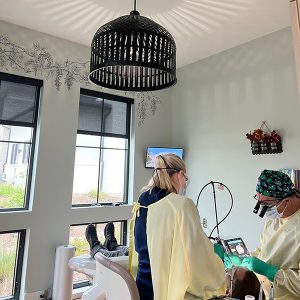Please note: We may not offer this service at our office. Call (940) 566-4888 to inquire about available treatment options.
A Simple, Minimally Invasive Alternative to Root Canal Therapy
For patients with tooth damage or decay, pulp capping may be a suitable alternative to root canal treatment. This procedure is often recommended when the tooth pulp is exposed but not severely infected, allowing the tooth to heal naturally without the need for more invasive therapies.
If you’re looking for a minimally invasive dental solution, contact our Denton, TX, office at (940) 566-4888 to learn more about pulp capping and determine if it’s the right choice for you.
What Is Pulp Capping?
Pulp capping is a conservative dental procedure that involves placing medicated materials over exposed tooth pulp to stimulate healing and protect the tooth from further damage or infection. It’s commonly used when a tooth is compromised by decay or trauma, but the exposed dental pulp is not yet infected.
Benefits of Pulp Capping
Pulp capping offers several benefits for patients with damaged or infected teeth. Some of the most significant benefits include:
- Preserve Your Natural Tooth: This procedure can prevent the need for more invasive treatments such as root canal therapy or extraction.
- Faster Healing Time: With pulp capping, recovery is often quicker compared to more intensive procedures.
- Lower Risk of Complications: Because it’s less invasive, patients experience fewer post-treatment complications like infection or nerve damage.
- Cost-Effective Treatment: Pulp capping is generally a more affordable alternative to root canals or extractions, making it an attractive option for patients with milder tooth damage.
Are You a Candidate for Pulp Capping?
Pulp capping is ideal for patients who have minimal tooth decay, infection, or damage but whose pulp is exposed. It’s most effective when the pulp is healthy or only mildly irritated, as severe infections typically require root canal therapy. If you’re unsure about your condition, our Denton dentists can evaluate your oral health and recommend the appropriate treatment.
How Does Pulp Capping Work?
Pulp capping procedures are typically performed in two different ways: direct pulp capping and indirect pulp capping.
Direct Pulp Capping
The direct pulp capping procedure involves applying medicated pulp capping material directly to the exposed pulp of a tooth. This procedure is typically performed when a small area of the pulp has been exposed due to a cavity or other damage.
The medicated material used in direct pulp capping promotes healing and prevents infection. Your dentist will clean the exposed pulp and apply the medicated material. After applying the material, they’ll place a filling or crown over the tooth to protect it from further damage.
The direct pulp capping procedure involves:
- Removing Tooth Decay: Your endodontist will start by drilling the cavity and removing any decayed tooth material. They’ll thoroughly clean the area.
- Adding Sedative Material: After the decay is removed, they’ll use a sedative material to protect the tooth pulp from bacteria until the dentin can repair itself.
- Filling the Cavity: A temporary or permanent dental filling is placed to strengthen the tooth and allow the patient to bite and chew easily.
Indirect Pulp Capping
The indirect pulp capping procedure is typically performed when a larger area of the pulp has been exposed due to significant decay or damage. This procedure involves removing as much decayed or damaged tissue as possible and applying a medicated material to the remaining pulp.
The medicated material used in indirect pulp capping encourages the growth of new dentin, a substance that helps protect the pulp. Your dentist will place a temporary filling over the tooth to protect it while the dentin grows.
The indirect pulp capping procedure typically involves:
- Removing Decay: The endodontist will start by removing decayed tooth material but will leave a small portion to cover the pulp tissue.
- Adding Sedative Material: Just like direct pulp capping, a protective sedative material is applied to the decayed dentin.
- Filling the Cavity: Then, the dental professional will place the temporary filling until you come back for your second appointment.
- Evaluating Progress: After about six to eight months, your endodontist will remove the temporary filling to evaluate the status of your recovery. In most cases, the previously decayed dentin has regenerated, and any residual decay is removed.
- Getting the Permanent Restoration: Lastly, a permanent dental filling is placed to strengthen the tooth and allow the patient to eat, bite, and speak normally.
Materials Used in Pulp Capping
Some of the most effective materials for pulp capping include:
- Calcium Hydroxide: Promotes the formation of new dentin to protect the tooth.
- Mineral Trioxide Aggregate (MTA): Currently regarded as the gold standard for pulp capping, MTA has high biocompatibility, promotes dentin regeneration, and provides excellent sealing capabilities.
- Bioactive Cement (e.g. Biodentine): This material is biocompatible and encourages natural healing and dentin formation.
Frequently Asked Questions
The pulp capping procedure is performed under local anesthesia, so patients typically don’t feel pain. Some mild discomfort may occur afterward, but this can usually be managed with over-the-counter pain relievers.
After pulp capping, avoid eating or drinking anything for at least one hour to allow the anesthesia to wear off. After this time, patients can typically resume their diet, although they should avoid hard, crunchy, or sticky foods that could damage the treated tooth.
The procedure generally takes 30 to 60 minutes and can be completed in a single visit. However, if indirect pulp capping is performed, you may need to return for a follow-up appointment.
Insurance coverage for pulp capping varies depending on your insurance plan and treatment case. Some policies may cover it if it’s deemed medically necessary. We recommend checking with your provider to determine your coverage.
Discover an Easier Way to Preserve Your Teeth
Pulp capping is an effective treatment option for patients with mild to moderate tooth damage or decay. By promoting the natural healing of the pulp, this procedure can help you avoid more extensive treatments like root canal therapy.
Call our Denton dentists today at (940) 566-4888 to learn if pulp capping is right for you. We proudly serve the communities of Denton, Robson Ranch, Corinth, Argyle, and Krum, TX.




